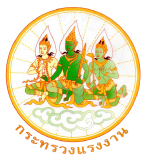The Ministry of Labour’s Inspector-General Mr. Soothi Sukosol spoke about the 329th Session of the International Labour Organization (ILO) Governing Body which took place from 13-25 March 2017 in Geneva. The Governing Body gave consensus to dismiss claims by the International Trade Union Confederation (ITUC) and Federation of International Transport Workers (ITF) which reported labour issues in the Thai fishing industry using information in 2015. The ILO acknowledged Thailand’s progress on resolving slavery in the fishing industry, which illustrated the ILO’s confidence in the Thai government. The ILO also showed signs of supporting the Thai government, particularly on foreign worker protection. In the past, the Thai government has given significant effort to eliminating slavery and human trafficking in the fishing industry, whereby focusing on enhancing employment to improve foreign worker management. Legislation has been amended, in addition to the enforcement of the Royal Decree on Recruitment of Foreigners BE 2559 which aims to eliminate fraud agents/middlemen and recruitment agencies. Harsher penalties have also been implemented including more thorough inspections and monitoring on recruitment of migrant workers and reduction of expenses for working in Thailand.
Mr. Soothi stated that Thailand has consistently conformed to ILO convention 29 concerning forced or compulsory labour, where the Thai government has implemented more thorough monitoring measures, having employed language interpreters to conduct random inspections of workers both on and offshore to eliminate risks of human trafficking. Employment efforts have been initiated to increase the population of labour inspectors, in response to the Cabinet’s approval for 186 more inspectors on 28 March 2017. The ILO Governing Body acknowledged the Thai government’s efforts on working with foreign governments to improve employment and occupational conditions in the fishing industry, including reporting channels and assistive measures to human trafficking victims, permitting them to remain in the country until full physical and emotional recovery.
The Thai government has made human trafficking elimination a national agenda, where it has improved legal frameworks, increased penalties for child labour crimes, issues ministerial regulations for workers in the fishing industry, amended the definition of human trafficking by including debt bondage and exploitation, and has also improved enforcement of laws and channels for report. The government has further promoted good labour practices (GLP) in the fishing and seafood processing industry, where it focuses on eliminating slavery and child labour. Furthermore, it aims to promote freedom of association, collective bargaining and workplace collaboration ensuring no discrimination, fair compensation and workplace safety and hygiene.
——————————————
Bureau of Public Relations / 1 April 2017




